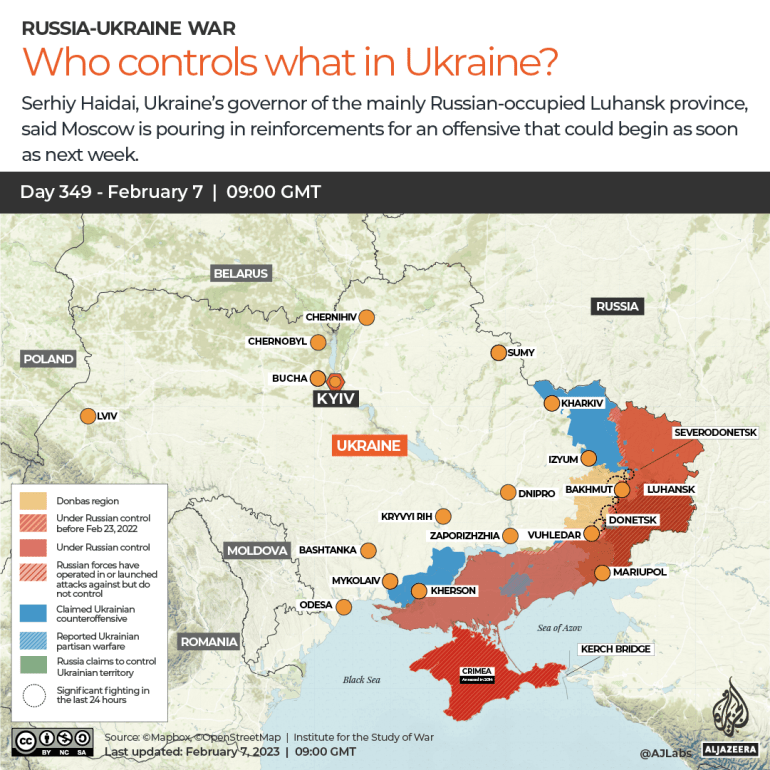Moscow has repeatedly accused NATO of involvement in the war by supplying arms to Kyiv, warning supplies are ‘legitimate targets’.
Western weapons supplies to Ukraine are dragging NATO directly into the conflict and could lead to an “unpredictable” escalation, Russia’s defence minister says.
“The US and its allies are trying to prolong the conflict as much as possible,” Defence Minister Sergey Shoigu said in a conference call on Tuesday with military officials.
“To do this, they have started supplying heavy offensive weapons, openly urging Ukraine to seize our territories. In fact, such steps are dragging NATO countries into the conflict and could lead to an unpredictable level of escalation.”
His allusion to “our territories” appeared to be a reference to four regions in eastern and southern Ukraine – Donetsk, Luhansk, Zaporizhzhia and Kherson – that Russia claims to have annexed following referendums last September that were condemned by Kyiv and its Western allies as illegitimate.
Much of the territory in the Russian-claimed regions is currently in Ukrainian hands.
Moscow has repeatedly accused the NATO alliance of playing a direct role in the war by supplying arms to Kyiv.
Ukraine says the weapons are urgently needed to stave off Russian attacks and boost its firepower for a spring offensive against Moscow’s forces. Ukrainian officials say Moscow is accumulating arms and reserves for a renewed assault in the coming weeks.
UN Secretary-General António Guterres expressed concern about the war’s recent direction. Peace prospects “keep diminishing” and “the chances of further escalation and bloodshed keep growing”, he said in a speech late Monday.
“I fear the world is not sleepwalking into a wider war – I fear it is doing so with its eyes wide open.”
Longer-range rockets
The United States has sent more than $20bn worth of military aid to Ukraine since Russia’s invasion last February, and is set to provide Kyiv with longer-range rockets as part of a new $2bn package of weapons announced last week.
Since the beginning of the year, Western countries have pledged hundreds of tanks and armoured vehicles to Ukraine to give it the firepower and mobility to push through Russian lines and recapture occupied territory later this year.
The new US package of weapons was expected to include longer-range rockets, which would give Ukraine the ability to hit Russian supply lines in all of the territory it occupied in Ukraine’s mainland and parts of the Crimea Peninsula.
But it will take months for the new arms to arrive. Meanwhile, Ukraine faces a Russian force with its manpower replenished by Moscow’s call-up of hundreds of thousands of reservists.
Russia continues to throw waves of troops at cities and towns in the eastern Donbas region.
Fighting has focused for months around the Ukrainian-held city of Bakhmut in eastern Donetsk province, which Russia has been trying to encircle.
Moscow has also launched an assault further south against Vuhledar, a Ukrainian-held bastion at the strategic intersection between the eastern and southern front lines.
“Military operations are at the moment progressing with success in the areas around Vuhledar and Artemovsk,” said Shoigu, using the previous name for the besieged town of Bakhmut.
Shoigu listed seven settlements that Russia has recently “liberated”, including the salt-mining town of Soledar that came under Russian control in January.

‘Undermanned, inexperienced units’
Some military analysts have been sceptical, however, about Russia’s ability to mount a large new offensive in the coming weeks. Ukraine and Russia are both still training their new troops and amassing weapons.
The United Kingdom’s defence ministry said in an assessment on Tuesday that Russia is “requiring undermanned, inexperienced units to achieve unrealistic objectives due to political and professional pressure”.
“Russian leaders will likely continue to demand sweeping advances,” it added. “It remains unlikely that Russia can build up the forces needed to substantially affect the outcome of the war within the coming weeks.”
Michael Kofman, an American military analyst and director of Russia studies at the CAN, a research organisation in Arlington, Virginia, tweeted on Monday that it was unclear how big an offensive Russia would be able to mount.
He added, “but I suspect it may prove underwhelming, focused largely on the Donbas”.


